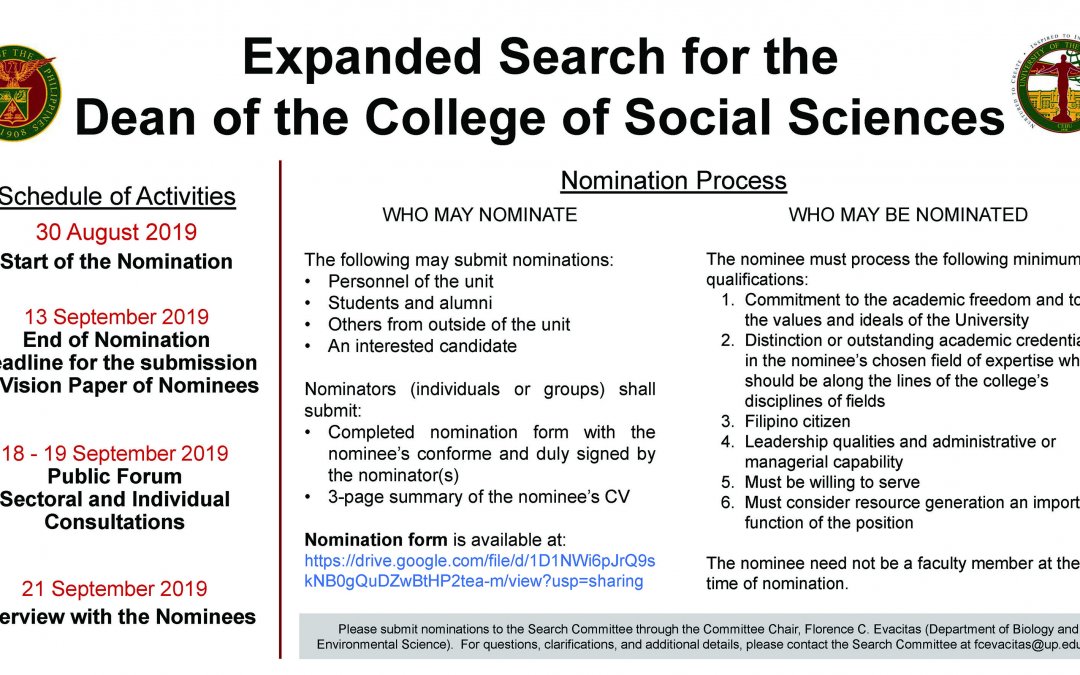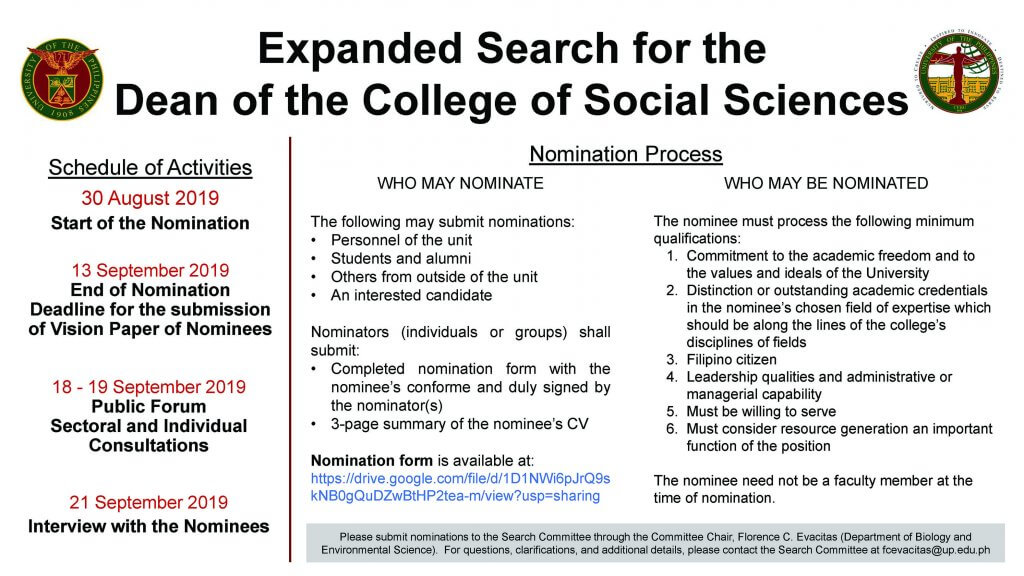MISSION – VISION for the COLLEGE OF SOCIAL SCIENCES
Atty. Francis Michael C. Abad
My vision for the College of Social Sciences can be summarized into two policy agenda: A people-centric vision and a continued development mission. I see the college not as an abstract component of an institution but a result of all the people’s interaction, production, and collective endeavor. This is the foundation of every organization and true development of the college can only be achieved upon a solid prioritization of its constituents. Hence, I am advocating for a people-centric administration in view of achieving a truly progressive, inclusive, and facilitative development. As such, I see no need to make drastic departure from the achievements already made by its previous dean and division chairs. I believe that we have been on the right track although improvements are to be made.
In order to initiate these changes, the collective vision of the college should be the bedrock upon which new ones are to be built. The dean should be sensitive to the needs of the college and should always work to support their aspirations and promote their welfare through a consultative, fair, emphatic, and efficient administration.
Nevertheless, I propose the following measures for improvement with reservations for new ones when the need arise in due time.
First, for the FACULTY, I would like to prioritize our support for our tenure-track members who are hurdling the difficulties required of their jobs. Many times we have lost good and valuable teachers owing to the ‘up or out’ policy of the university. This ‘up or out’ has brought down the morale not only of the junior faculty but as well as that of the other faculty members, staff, and students. I see this as the most pressing concern that needs to be addressed. We cannot see a better future for the college if our junior faculty always get thrown away by this policy while they are building their expertise in preparation for the next generation of students. While I am powerless to change this policy and while, to a certain extent, this policy has its merits, I propose that new teachers should be guided by a proper mentoring system. They also need to be given a proper orientation to the complex university rules that affect them. Support for further studies and research publication must be carefully provided. An example is by giving them academic loads which are relatively easier to manage while they are doing their research or study. I will push for easier access to research funding given that junior faculty cannot always compete with the senior faculty in funding applications. On top of these, we need to develop their research capabilities through the available resources of the college.
For the rest of the faculty, I intend to propose the enhancement of our expertise and new competencies. This can be done through a strategic implementation of the API funds. As UP is on its track to competing with the best universities in the world, we must also strive to be better teachers in keeping with this goal. Access to online researches and printed materials will be of paramount importance. The college had always had extra budgetary allocation for these and I intend to maximize that opportunity. It goes without saying that the utilization and incorporation of ICT for teaching and learning enhancement is an integral part in this development.
If we are to increase our research, publication, and public-service output, then it should be in line with UP Cebu’s Integrated Research and Extension Agenda. We need to push for more funding for research and public-oriented activities. We need to rationalize policies on joint researches both in terms of funding and recognition. Continuing training for research methods, ethics, and topics must be given on a regular basis. To start, we need to support the CVSC’s move for a multi-disciplinary online journal and find ways to establish national and international linkages through research.
For the STAFF, what I deem most important is the rationalization of workload. I stand by my opinion that the clerks are the most oppressed members of our institution. They cater to everyone in the college, are overworked, underpaid, and alone. Hence, expectations from staff should be realistic and not oppressive. Their workload should be commensurate to their capabilities and time. We will continue with our ongoing demand for more personnel and more time to accomplish their tasks. We will again call for the hiring of student assistants to ease their workload. We will push for more decent compensation and access to promotion and item. And although I cannot do this on my own, I will raise and focus on these goals at every opportunity. Finally, the college must encourage and facilitate their access to professional growth. Our former clerk is now a successful professor in another excellent university. This is the kind of principle that we should advocate for our staff.
It needs to be underscored that at the heart of this university is the studentry who are the beneficiaries of college development. STUDENTS must be considered in all aspects of policy making. In this respect, policies shall continue to be pro-students and the college will work to ensure their access to sufficient learning materials and facilities. Furthermore, their role in the administrative aspect should never be marginalized. The college should provide avenue for grievances and complaints in keeping with the sensitivity and vulnerability of students in existing power-relations between them and the faculty and administrators.
We will continue to recognize and support student activism in whatever peaceful form, in keeping with academic freedom and the university’s age-old principle for free thinking.
Academically, the college will ensure that existing and proposed curricula are student-centered. We will ensure that they are up-to-date, relevant, and useful not only during their study but also to their post-graduation pursuits. Being an institution for higher learning, the college shall encourage their desire for further learning. We will find a way to maximize faculty consultation hours by utilizing it for academic support. We will coordinate with OSA and formulate viable policies towards this end. We will push for the formulation of policies involving special considerations for students in cases when a student needs to request for time- extensions or other considerations due to sudden life-changing events, physical and mental illness, and other emergencies. This is an important facet of the kind of academic policy that we will formulate as a show of support for the physical and mental well-being of all members of our academic community.
Application of procedure should be fair and in accordance with due process. Rules and processes governing the college and university should be predictable. We must know the results of our applications immediately in order to afford clarification and appeal. The college must develop an “anti-shock” policy so we are able to know our alternatives and recourse before it is too late.
For INFRASTRUCTURE PROJECTS we hope to create more faculty, staff, and student spaces including more computer laboratories suitable for work and research. Rehabilitation of dilapidated facilities will also be made. I will propose for the soundproofing of certain classrooms which are affected by the noise coming from the A.S. Lobby. There is also a need to propose for the expansion of the A.S. Canteen and its dining areas.
Needless to say, the fight for an affordable faculty and staff housing will continue to be a part of our agenda.
EQUIPMENT AND FACILITIES should also be improved. Access to computers, portable devices, scanners, printers, and other needed equipment will be prioritized in keeping with the goal of utilizing ICT in our pedagogy, especially for the Highschool and Masters in Education program. Our P.E. equipment need to become sufficient for all our students. Finally, functioning airconditioners for classrooms should be available.
Our ACADEMIC PROGRAMS should evolve into a more relevant, updated, and higher level of excellence. That is why support for the new graduate programs and centers should receive much attention now. It is important that in all aspects of curriculum development, the integration of ICT, blended learning, and utilization of new technologies will be considered. Gender equality, social awareness, empowerment, and purpose will be the guiding principles of existing and new subjects.
Download: Mission-Vision Statement of Atty. Francis Michael C. Abad
RELATED:Expanded Search for the Dean of the College of Social Sciences


